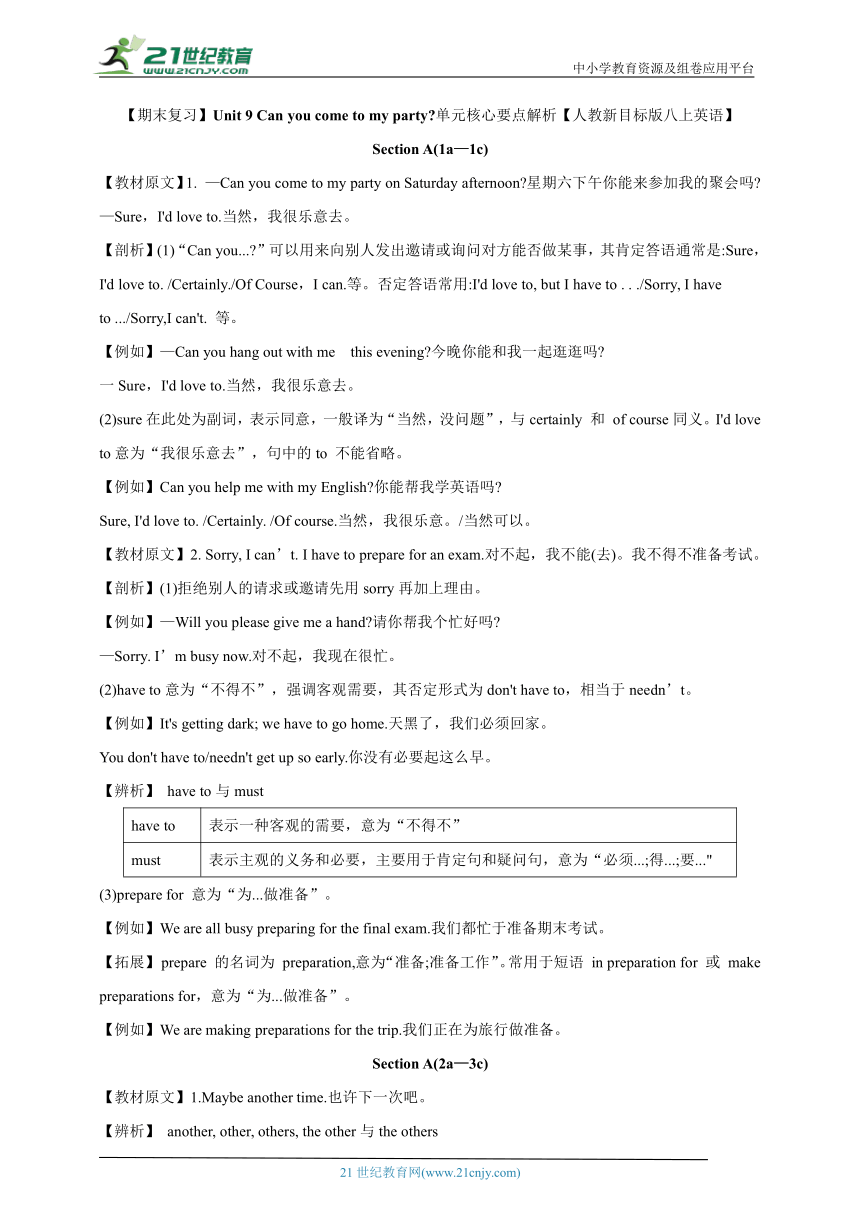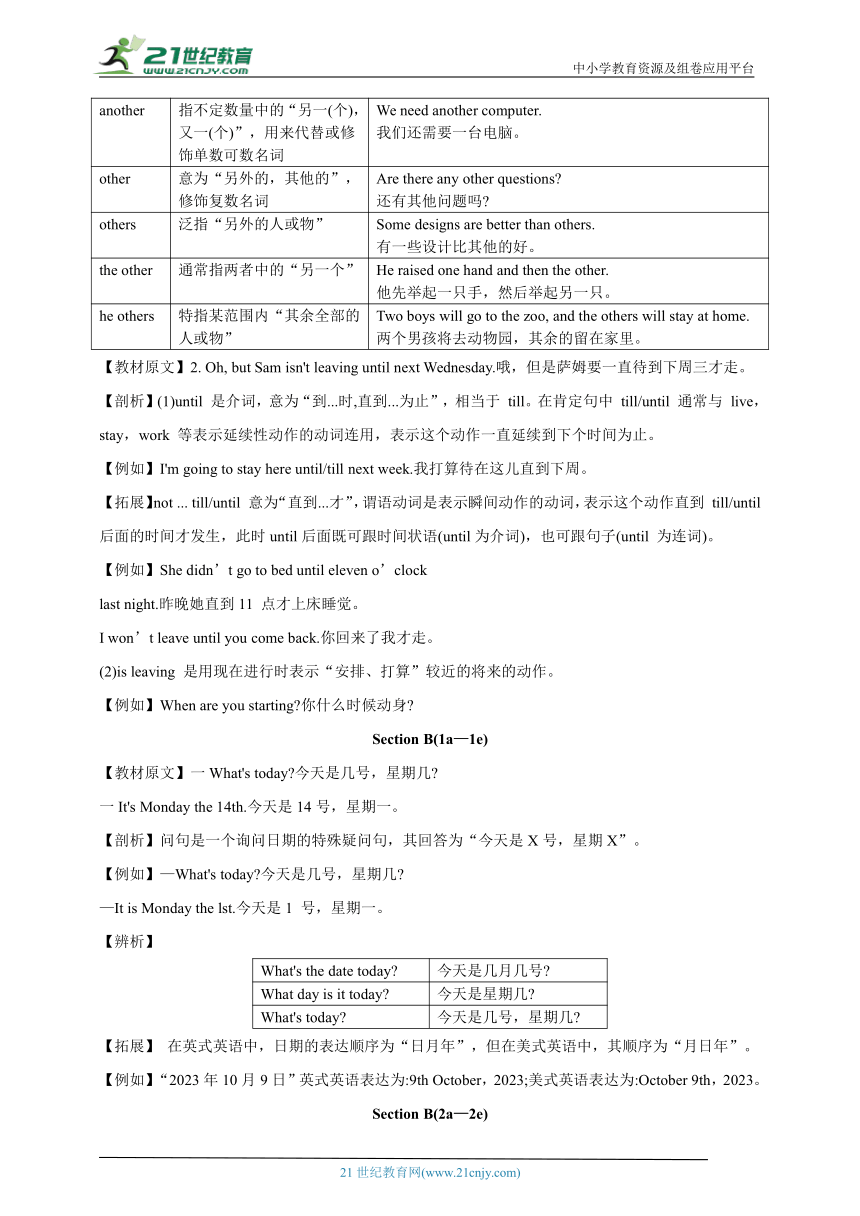

中小学教育资源及组卷应用平台 【期末复习】Unit 9 Can you come to my party 单元核心要点解析【人教新目标版八上英语】 Section A(1a—1c) 【教材原文】1. —Can you come to my party on Saturday afternoon 星期六下午你能来参加我的聚会吗 —Sure,I'd love to.当然,我很乐意去。 【剖析】(1)“Can you... ”可以用来向别人发出邀请或询问对方能否做某事,其肯定答语通常是:Sure,I'd love to. /Certainly./Of Course,I can.等。否定答语常用:I'd love to, but I have to . . ./Sorry, I have to .../Sorry,I can't. 等。 【例如】—Can you hang out with me this evening 今晚你能和我一起逛逛吗 一Sure,I'd love to.当然,我很乐意去。 (2)sure在此处为副词,表示同意,一般译为“当然,没问题”,与certainly 和 of course同义。I'd love to意为“我很乐意去”,句中的to 不能省略。 【例如】Can you help me with my English 你能帮我学英语吗 Sure, I'd love to. /Certainly. /Of course.当然,我很乐意。/当然可以。 【教材原文】2. Sorry, I can’t. I have to prepare for an exam.对不起,我不能(去)。我不得不准备考试。 【剖析】(1)拒绝别人的请求或邀请先用sorry再加上理由。 【例如】—Will you please give me a hand 请你帮我个忙好吗 —Sorry. I’m busy now.对不起,我现在很忙。 (2)have to意为“不得不”,强调客观需要,其否定形式为don't have to,相当于needn’t。 【例如】It's getting dark; we have to go home.天黑了,我们必须回家。 You don't have to/needn't get up so early.你没有必要起这么早。 【辨析】 have to与must have to 表示一种客观的需要,意为“不得不” must 表示主观的义务和必要,主要用于肯定句和疑问句,意为“必须...;得...;要..." (3)prepare for 意为“为...做准备”。 【例如】We are all busy preparing for the final exam.我们都忙于准备期末考试。 【拓展】 prepare 的名词为 preparation,意为“准备;准备工作”。常用于短语 in preparation for 或 make preparations for,意为“为...做准备”。 【例如】We are making preparations for the trip.我们正在为旅行做准备。 Section A(2a—3c) 【教材原文】1.Maybe another time.也许下一次吧。 【辨析】 another, other, others, the other与the others another 指不定数量中的“另一(个),又一(个)”,用来代替或修饰单数可数名词 We need another computer. 我们还需要一台电脑。 other 意为“另外的,其他的”,修饰复数名词 Are there any other questions 还有其他问题吗 others 泛指“另外的人或物” Some designs are better than others. 有一些设计比其他的好。 the other 通常指两者中的“另一个” He raised one hand and then the other. 他先举起一只手,然后举起另一只。 he others 特指某范围内“其余全部的人或物” Two boys will go to the zoo, and the others will stay at home. 两个男孩将去动物园,其余的留在家里。 【教材原文】2. Oh, but Sam isn't leaving until next Wednesday.哦,但是萨姆要一直待到下周三才走。 【剖析】(1)until 是介词,意为“到...时,直到...为止”,相当于 till。在肯定句中 till/until 通常与 live,stay,work 等表示延续性动作的动词连用,表示这个动作一直延续到下个时间为止。 【例如】I'm going to stay here until/till next week.我打算待在这儿直到下周。 【拓展】not ... till/until 意为“直到...才”,谓语动词是表示瞬间动作的动词,表示这个动作直到 till/until 后面的时间才发生,此时until后面既可跟时间状语(until为介词),也可跟句 ... ...
~~ 已预览到文档结尾了 ~~